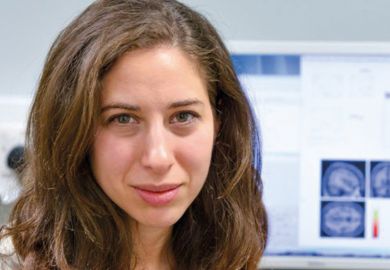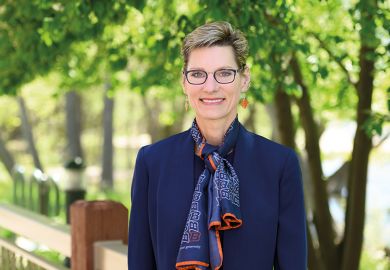Naomi Oreskes is professor of the history of science and affiliated professor of earth and planetary sciences at Harvard University. Her books include Merchants of Doubt: How a Handful of Scientists Obscured the Truth on Issues from Tobacco Smoke to Global Warming, co-authored with science historian Erik Conway. Last month, she received the British Academy Medal for the book and her commitment to documenting the role of corporations in distorting scientific findings for political ends.
Where and when were you born?
New York City, 1958.
How has this shaped who you are?
I was born into a world in which science was viewed as essential to the progress of humankind, and growing up I absorbed that message. It was reinforced by my father, a scientist, and by the New York City public school system, where there was a clear message that the country and the world needed scientists. It was taken virtually as a moral obligation that if you could do science, you did it. Also, being born in NYC, I was raised to think clearly and talk straight.
What divided your life into a ‘before’ and ‘after’?
Becoming a mother. That really does change everything. You have less time for yourself, but it is the most amazing thing. My 2004 paper on the scientific consensus on climate change changed my professional life because I started being attacked. That led me to try to understand who was attacking me and why, which led to my meeting Erik Conway, and writing Merchants of Doubt.
Have you had a eureka moment in your career?
Absolutely: when [Professor Conway and I] realised that the climate change deniers had worked with the tobacco industry. That is when we knew for sure that what we were looking at was not a scientific debate.
Since you published Merchants of Doubt in 2010, have efforts to stifle scientific findings got better or worse?
Worse. There’s no doubt about that. Our book is, sadly, more relevant than ever.
In the current political environment, do you still see scientific evidence being distorted?
Of course. It has got notably worse since 2016.
How do you deal with attacks from climate change deniers?
It comes with the territory. The best way to deal with it is just to keep working. The whole point of the attacks is to distract and demoralise, so the best response is to refuse to do so. And, as needed, open a good bottle of wine, take the dog for a walk and enjoy the sunset. Life is still good, despite the ugliness.
How can academics combat this?
Academics need to stand up and be counted. When we see distortions and misrepresentations, we need to say, “That is a distortion, and here is why.” Stay calm, explain what we know and how we know it.
What advice would you give to your younger self?
Have more fun. I was very serious and worked very hard. I now know I could have eased off a bit. But back then, as a woman in science, there was enormous pressure to disprove the naysayers by being not just good but outstanding. I am glad that young women today don’t have to deal with that. They need to be good, of course, but they don’t need to be better than the men. They just need to do their jobs.
What are the best and worst things about your job?
Best: my wonderful students. I learn so much from them. Worst: grading. I don’t think anyone enjoys grading, do they?
What advice would you give to prospective students to your field?
Find something meaningful, so that you feel motivated to get up in the morning. Don’t spend a lot of time second-guessing yourself. If the topic you picked doesn’t turn out to be earth-shattering, that’s OK. Finish it, and then move on to something else. I published Merchants of Doubt when I was 50, and I am still doing important work. Our culture places too much emphasis on youth and novelty. This is especially true for women. But for many reasons, many of us do our best work post-45, so don’t worry about being fast out of the gate. Rome wasn’t built in a day, and neither are academic careers.
What do you do for fun?
Mostly outdoor activities: in the summer, I swim, kayak and paddleboard. In the winter, I ski. In the spring and fall, I walk in the woods with my husband and my dog. I spend a lot of time with my dog, my wonderful miniature Australian shepherd. We walk together every day, and I take her to work as much as possible. And I have a wine cellar.
What’s your biggest regret?
Regrets are a waste of time and energy. My husband has a motto: look forward, not back, and make your decisions based on your future not your past. Yet, I do have one [regret]: that I didn’t start taking skiing lessons earlier. I didn’t start properly until I was 50. It’s hard to be really good when you start that late. When I was younger, it seemed self-indulgent, but now I think that outdoor activity is one of the best things we can all do, for our physical and mental health. Skiing is mind-clearing, so as well as being fun and healthy, it makes me a better scholar.
What would you like to be remembered for?
Hopefully for being a good person, one who did what she could to prevent disruptive climate change from hurting people and the natural world. And for being a loving mother, a caring mentor and a dedicated teacher – not just in the classroom. I think of most of my public work as an extension of my teaching.
anna.mckie@timeshighereducation.com
Appointments
Nishan Canagarajah has been named vice-chancellor of the University of Leicester. Professor Canagarajah, currently pro vice-chancellor for research and enterprise at the University of Bristol, will take up the post in November. He will succeed Paul Boyle, who has moved to Swansea University as vice-chancellor. Professor Canagarajah, who was born in Sri Lanka, is an internationally recognised researcher specialising in signal processing. Gary Nixon, Leicester’s chair of council, said the selection committee had been “especially impressed by Nishan’s wide research experience, his outstanding performance with business and local enterprise and his inspiring leadership style”.
Jennifer Tour Chayes will be the new associate provost for the Division of Data Science and Information and dean of the School of Information at the University of California, Berkeley. Currently a Microsoft technical fellow and managing director for Microsoft Research in New England, New York and Montreal, she will take up her new role in January. Berkeley hailed her as a “renowned researcher in the field of network science” who was “celebrated for her work on models and algorithms that help explain the structure of the internet, social and economic networks, and networks in computational biology”.
Victor Salvador Batista and Zoltán Szabó have been appointed to endowed professorships at Yale University. Professor Batista has been named John Randolph Huffman professor of chemistry, while Professor Szabó has been selected as John S. Saden professor of philosophy.
Hanifa Shah has been named pro vice-chancellor and executive dean of the Faculty of Computing, Engineering and the Built Environment at Birmingham City University. Professor Shah joined the university in 2010.
Shawna Cooper-Gibson has been appointed vice-president of student services at Seton Hall University. Dr Cooper-Gibson currently serves as assistant provost for student academic services at Loyola University Chicago.
Betti-Sue Hertz is the new director and chief curator of the Wallach Art Gallery at Columbia University.
Register to continue
Why register?
- Registration is free and only takes a moment
- Once registered, you can read 3 articles a month
- Sign up for our newsletter
Subscribe
Or subscribe for unlimited access to:
- Unlimited access to news, views, insights & reviews
- Digital editions
- Digital access to THE’s university and college rankings analysis
Already registered or a current subscriber?




